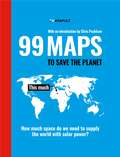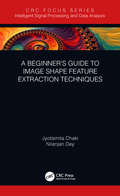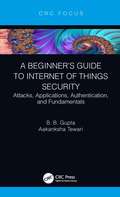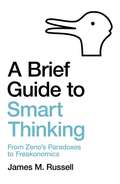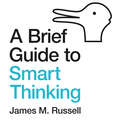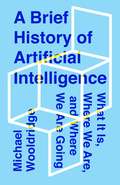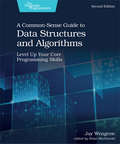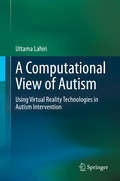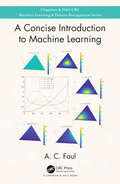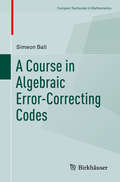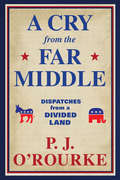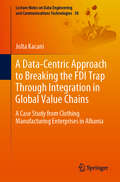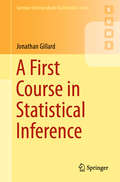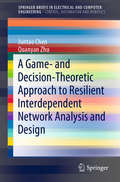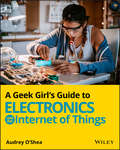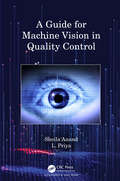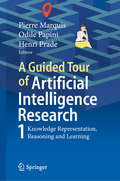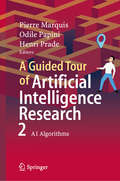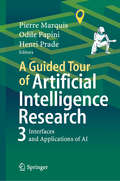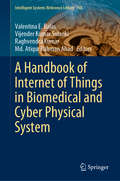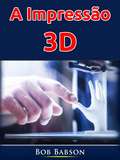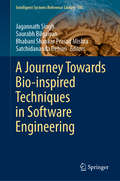- Table View
- List View
97 Things Every Scrum Practitioner Should Know: Collective Wisdom from the Experts
by Gunther VerheyenImprove your understanding of Scrum through the proven experience and collected wisdom of experts around the world. Based on real-life experiences, the 97 essays in this unique book provide a wealth of knowledge and expertise from established practitioners who have dealt with specific problems and challenges with Scrum.You'll find out more about the rules and roles of this framework, as well as tactics, strategies, specific patterns to use with Scrum, and stories from the trenches. You'll also gain insights on how to apply, tune, and tweak Scrum for your work. This guide is an ideal resource for people new to Scrum and those who want to assess and improve their understanding of this framework."Scrum Is Simple. Just Use It As Is.," Ken Schwaber"The 'Standing Meeting,'" Bob Warfield"Specialization Is for Insects," James O. Coplien"Scrum Events Are Rituals to Ensure Good Harvest," Jasper Lamers"Servant Leadership Starts from Within," Bob Galen"Agile Is More than Sprinting," James W. Grenning
99 Maps to Save the Planet: With an introduction by Chris Packham
by KATAPULT'Terrifying yet funny, surprising yet predictable, simple yet poignant' Chris PackhamA shocking but informative, eye-catching and witty book of maps that illustrate the perilous state of our planet.The maps in this book are often shocking, sometimes amusing, and packed with essential information:· Did you know that just 67 companies worldwide are responsible for 67 per cent of global greenhouse emissions? · Or that keeping a horse has the same carbon footprint as a 23,500-kilometre road trip? · Did you know how many countries use less energy than is consumed globally by downloading porn from the internet?· Do you know how much of the earth's surface has been concreted over?· Or how many trees would we have to plant to make our planet carbon-neutral?Presenting a wealth of innovative scientific research and data in stunning, beautiful infographics, 99 Maps to Save the Planet provides us with instant snapshots of the destruction of our environment. At one glance, we can see the precarious state of our planet - but also realise how easy it would be to improve it Enlightening, a bit frightening, but definitely inspiring, 99 Maps to Save the Planet doesn't provide practical tips on how to save our planet: it just presents the facts. And the facts speak for themselves. Once we know them, what excuse do we have for failing to act?
99 Tips for Creating Simple and Sustainable Educational Videos: A Guide for Online Teachers and Flipped Classes
by Karen CostaThe research is clear: online learning works best when faculty build regular, positive, and interactive relationships with students. A strategy that helps forge such a relationship is the use of videos. Student satisfaction and course engagement levels also increase with the use of instructor-generated videos – the subject of this book.Beginning by outlining the different types of videos you can create, and what the research says about their effectiveness, Karen Costa explains how they can be designed to reinforce learning, to align with and promote course outcomes, and to save you time across your courses. She then describes how to create successful videos with commonly available technologies such as your smartphone, and without a major investment of time, demonstrating the simple steps she took to develop her bank of videos and build her confidence to deliver short, straightforward learning aids that are effective and personal.Embedded QR codes in the text enable you to view sample videos and screencasts that bring the book’s advice to life as you read.If you’ve been wanting to include videos in your teaching but haven’t found the time or confidence, this book will help you to develop a simple and sustainable video development process, supporting both your success and the success of your students.
A Beginner’s Guide to Image Shape Feature Extraction Techniques (Intelligent Signal Processing and Data Analysis)
by Nilanjan Dey Jyotismita ChakiThis book emphasizes various image shape feature extraction methods which are necessary for image shape recognition and classification. Focussing on a shape feature extraction technique used in content-based image retrieval (CBIR), it explains different applications of image shape features in the field of content-based image retrieval. Showcasing useful applications and illustrating examples in many interdisciplinary fields, the present book is aimed at researchers and graduate students in electrical engineering, data science, computer science, medicine, and machine learning including medical physics and information technology.
A Beginner’s Guide to Internet of Things Security: Attacks, Applications, Authentication, and Fundamentals
by B. B. Gupta Aakanksha TewariA Beginner’s Guide to Internet of Things Security focuses on security issues and developments in the Internet of Things (IoT) environment. The wide-ranging applications of IoT, including home appliances, transportation, logistics, healthcare, and smart cities, necessitate security applications that can be applied to every domain with minimal cost. IoT contains three layers: application layer, middleware layer, and perception layer. The security problems of each layer are analyzed separately to identify solutions, along with the integration and scalability issues with the cross-layer architecture of IoT. The book discusses the state-of-the-art authentication-based security schemes, which can secure radio frequency identification (RFID) tags, along with some security models that are used to verify whether an authentication scheme is secure against any potential security risks. It also looks at existing authentication schemes and security models with their strengths and weaknesses. The book uses statistical and analytical data and explains its impact on the IoT field, as well as an extensive literature survey focusing on trust and privacy problems. The open challenges and future research direction discussed in this book will help to further academic researchers and industry professionals in the domain of security. Dr. Brij B. Gupta is an assistant professor in the Department of Computer Engineering, National Institute of Technology, Kurukshetra, India. Ms. Aakanksha Tewari is a PhD Scholar in the Department of Computer Engineering, National Institute of Technology, Kurukshetra, India.
A Brief Guide to Smart Thinking: From Zeno's Paradoxes to Freakonomics
by James M. RussellEach book is summarised to convey a brief idea of what each one has to offer the interested reader, while a 'Speed Read' for each book delivers a quick sense of what each book is like to read and a highly compressed summary of the main points of the book in question. The titles covered include thought-provoking classics on psychology, mindfulness, rationality, the brain, mathematical and economic thought and practical philosophy. The selection includes books about self-improvement as well as historically interesting accounts of how the mind works. Titles included go back as far as the Epictetus classic TheEnchiridion and Bertrand Russell's charming TheABC of Relativity, and proceed through classics such as Edward de Bono's Lateral Thinking and into the digital era with titles such as The Shallows and Big Data. The books are arranged chronologically, which draws attention to some of the interesting juxtapositions and connections between them. Some of the titles included are: Freakonomics, by Steven D. Levitt; Blink: The Power of Thinking Without Thinking, by Malcolm Gladwell; Sapiens: A Brief History of Humankind, by Yuval Noah Harari; The Organized Mind: Thinking Straight in the Age of Information Overload, by Daniel J. Levitin; The Descent of Man, by Grayson Perry; How the Mind Works, by Steven Pinker; Black Box Thinking: Why Some People Never Learn from Their Mistakes - But Some Do, by Matthew Syed; We Should All Be Feminists, by Chimamanda Ngozi Adichie; Guns, Germs, and Steel: The Fates of Human Societies, by Jared Diamond; The Black Swan: The Impact of the Highly Improbable, by Nassim Nicholas Taleb; Man's Search for Meaning, by Viktor E. Frankl; The News: A User's Manual, by Alain de Botton; Mindware: Tools for Smart Thinking, by Richard E. Nisbett; The ABC of Relativity, by Bertrand Russell; The Psychopath Test, by Jon Ronson; The Path: What Chinese Philosophers Can Teach Us About the Good Life, by Michael Puett; A Brief History of Time, by Stephen Hawking; Messy: The Power of Disorder to Transform Our Lives, by Tim Harford; Big Data: A Revolution That Will Transform How We Live, Work, and Think, by Viktor Mayer-Schönberger; Moneyball: The Art of Winning an Unfair Game, by Michael Lewis; The Survivors Club: The Secrets and Science That Could Save Your Life, by Ben Sherwood; Black Box Thinking, by Matthew Syed; Chaos: Making a New Science, by James Gleick; A Short History of Nearly Everything, by Bill Bryson; The Shallows: What the Internet Is Doing to Our Brains, by Nicholas Carr; Making Ideas Happen: Overcoming the Obstacles Between Vision and Reality, by Scott Belsky; The Enchiridion, by Epictetus; Gödel, Escher, Bach, by Douglas R. Hofstadter; What I Talk About When I Talk About Running, by Haruki Murakami; and Lateral Thinking, by Edward de Bono.
A Brief Guide to Smart Thinking: From Zeno's Paradoxes to Freakonomics
by James M. RussellEach book is summarised to convey a brief idea of what each one has to offer the interested reader, while a 'Speed Read' for each book delivers a quick sense of what each book is like to read and a highly compressed summary of the main points of the book in question. The titles covered include thought-provoking classics on psychology, mindfulness, rationality, the brain, mathematical and economic thought and practical philosophy. The selection includes books about self-improvement as well as historically interesting accounts of how the mind works. Titles included go back as far as the Epictetus classic The Enchiridion and Bertrand Russell's charming The ABC of Relativity, and proceed through classics such as Edward de Bono's Lateral Thinking and into the digital era with titles such as The Shallows and Big Data. The books are arranged chronologically, which draws attention to some of the interesting juxtapositions and connections between them. Some of the titles included are: Freakonomics, by Steven D. Levitt; Blink: The Power of Thinking Without Thinking, by Malcolm Gladwell; Sapiens: A Brief History of Humankind, by Yuval Noah Harari; The Organized Mind: Thinking Straight in the Age of Information Overload, by Daniel J. Levitin; The Descent of Man, by Grayson Perry; How the Mind Works, by Steven Pinker; Black Box Thinking: Why Some People Never Learn from Their Mistakes - But Some Do, by Matthew Syed; We Should All Be Feminists, by Chimamanda Ngozi Adichie; Guns, Germs, and Steel: The Fates of Human Societies, by Jared Diamond; The Black Swan: The Impact of the Highly Improbable, by Nassim Nicholas Taleb; Man's Search for Meaning, by Viktor E. Frankl; The News: A User's Manual, by Alain de Botton; Mindware: Tools for Smart Thinking, by Richard E. Nisbett; The ABC of Relativity, by Bertrand Russell; The Psychopath Test, by Jon Ronson; The Path: What Chinese Philosophers Can Teach Us About the Good Life, by Michael Puett; A Brief History of Time, by Stephen Hawking; Messy: The Power of Disorder to Transform Our Lives, by Tim Harford; Big Data: A Revolution That Will Transform How We Live, Work, and Think, by Viktor Mayer-Schönberger; Moneyball: The Art of Winning an Unfair Game, by Michael Lewis; The Survivors Club: The Secrets and Science That Could Save Your Life, by Ben Sherwood; Black Box Thinking, by Matthew Syed; Chaos: Making a New Science, by James Gleick; A Short History of Nearly Everything, by Bill Bryson; The Shallows: What the Internet Is Doing to Our Brains, by Nicholas Carr; Making Ideas Happen: Overcoming the Obstacles Between Vision and Reality, by Scott Belsky; The Enchiridion, by Epictetus; Gödel, Escher, Bach, by Douglas R. Hofstadter; What I Talk About When I Talk About Running, by Haruki Murakami; and Lateral Thinking, by Edward de Bono.
A Brief Guide to Smart Thinking: From Zeno’s Paradoxes to Freakonomics
by James M. RussellEach book is summarised to convey a brief idea of what each one has to offer the interested reader, while a 'Speed Read' for each book delivers a quick sense of what each book is like to read and a highly compressed summary of the main points of the book in question. The titles covered include thought-provoking classics on psychology, mindfulness, rationality, the brain, mathematical and economic thought and practical philosophy. The selection includes books about self-improvement as well as historically interesting accounts of how the mind works. Titles included go back as far as the Epictetus classic The Enchiridion and Bertrand Russell's charming The ABC of Relativity, and proceed through classics such as Edward de Bono's Lateral Thinking and into the digital era with titles such as The Shallows and Big Data. The books are arranged chronologically, which draws attention to some of the interesting juxtapositions and connections between them. Some of the titles included are: Freakonomics, by Steven D. Levitt; Blink: The Power of Thinking Without Thinking, by Malcolm Gladwell; Sapiens: A Brief History of Humankind, by Yuval Noah Harari; The Organized Mind: Thinking Straight in the Age of Information Overload, by Daniel J. Levitin; The Descent of Man, by Grayson Perry; How the Mind Works, by Steven Pinker; Black Box Thinking: Why Some People Never Learn from Their Mistakes - But Some Do, by Matthew Syed; We Should All Be Feminists, by Chimamanda Ngozi Adichie; Guns, Germs, and Steel: The Fates of Human Societies, by Jared Diamond; The Black Swan: The Impact of the Highly Improbable, by Nassim Nicholas Taleb; Man's Search for Meaning, by Viktor E. Frankl; The News: A User's Manual, by Alain de Botton; Mindware: Tools for Smart Thinking, by Richard E. Nisbett; The ABC of Relativity, by Bertrand Russell; The Psychopath Test, by Jon Ronson; The Path: What Chinese Philosophers Can Teach Us About the Good Life, by Michael Puett; A Brief History of Time, by Stephen Hawking; Messy: The Power of Disorder to Transform Our Lives, by Tim Harford; Big Data: A Revolution That Will Transform How We Live, Work, and Think, by Viktor Mayer-Schönberger; Moneyball: The Art of Winning an Unfair Game, by Michael Lewis; The Survivors Club: The Secrets and Science That Could Save Your Life, by Ben Sherwood; Black Box Thinking, by Matthew Syed; Chaos: Making a New Science, by James Gleick; A Short History of Nearly Everything, by Bill Bryson; The Shallows: What the Internet Is Doing to Our Brains, by Nicholas Carr; Making Ideas Happen: Overcoming the Obstacles Between Vision and Reality, by Scott Belsky; The Enchiridion, by Epictetus; Gödel, Escher, Bach, by Douglas R. Hofstadter; What I Talk About When I Talk About Running, by Haruki Murakami; and Lateral Thinking, by Edward de Bono.
A Brief History of Artificial Intelligence: What It Is, Where We Are, and Where We Are Going
by Michael WooldridgeFrom Oxford's leading AI researcher comes a fun and accessible tour through the history and future of one of the most cutting edge and misunderstood field in science: Artificial IntelligenceThe somewhat ill-defined long-term aim of AI is to build machines that are conscious, self-aware, and sentient; machines capable of the kind of intelligent autonomous action that currently only people are capable of. As an AI researcher with 25 years of experience, professor Mike Wooldridge has learned to be obsessively cautious about such claims, while still promoting an intense optimism about the future of the field. There have been genuine scientific breakthroughs that have made AI systems possible in the past decade that the founders of the field would have hailed as miraculous. Driverless cars and automated translation tools are just two examples of AI technologies that have become a practical, everyday reality in the past few years, and which will have a huge impact on our world.While the dream of conscious machines remains, Professor Wooldridge believes, a distant prospect, the floodgates for AI have opened. Wooldridge's A Brief History of Artificial Intelligence is an exciting romp through the history of this groundbreaking field--a one-stop-shop for AI's past, present, and world-changing future.
A Common-Sense Guide to Data Structures and Algorithms, Second Edition: Level Up Your Core Programming Skills
by Jay WengrowAlgorithms and data structures are much more than abstract concepts. Mastering them enables you to write code that runs faster and more efficiently, which is particularly important for today’s web and mobile apps. Take a practical approach to data structures and algorithms, with techniques and real-world scenarios that you can use in your daily production code, with examples in JavaScript, Python, and Ruby. This new and revised second edition features new chapters on recursion, dynamic programming, and using Big O in your daily work. Use Big O notation to measure and articulate the efficiency of your code, and modify your algorithm to make it faster. Find out how your choice of arrays, linked lists, and hash tables can dramatically affect the code you write. Use recursion to solve tricky problems and create algorithms that run exponentially faster than the alternatives. Dig into advanced data structures such as binary trees and graphs to help scale specialized applications such as social networks and mapping software. You’ll even encounter a single keyword that can give your code a turbo boost. Practice your new skills with exercises in every chapter, along with detailed solutions. Use these techniques today to make your code faster and more scalable.
A Computational View of Autism: Using Virtual Reality Technologies in Autism Intervention
by Uttama LahiriThis book first explains autism, its prevalence, and some conventional intervention techniques, and it then describes how virtual reality technology can support autism intervention and skills training. The approaches and technologies covered include immersive virtual reality, augmented reality and mixed reality. The tasks covered include emotion recognition, affective computing, teaching communication skills, imparting literacy skills, training for imitation skills, and joint attention skills. Most of the chapters assume no prerequisite knowledge of autism or virtual reality, and they are supported throughout with detailed references for further investigation.While the author is an engineer by profession, with specialist knowledge in robotics and computer-based platforms, in this book she adopts a user perspective and cites many real-life examples from her own experience. The book is suitable for students of cognitive science, and researchers and practitioners engaged with designing and offering technological assistance for special needs training.
A Concise Introduction to Machine Learning
by A.C. FaulThe emphasis of the book is on the question of Why – only if why an algorithm is successful is understood, can it be properly applied, and the results trusted. Algorithms are often taught side by side without showing the similarities and differences between them. This book addresses the commonalities, and aims to give a thorough and in-depth treatment and develop intuition, while remaining concise. This useful reference should be an essential on the bookshelves of anyone employing machine learning techniques. The author's webpage for the book can be accessed here.
A Course in Algebraic Error-Correcting Codes (Compact Textbooks in Mathematics)
by Simeon BallThis textbook provides a rigorous mathematical perspective on error-correcting codes, starting with the basics and progressing through to the state-of-the-art. Algebraic, combinatorial, and geometric approaches to coding theory are adopted with the aim of highlighting how coding can have an important real-world impact. Because it carefully balances both theory and applications, this book will be an indispensable resource for readers seeking a timely treatment of error-correcting codes. Early chapters cover fundamental concepts, introducing Shannon’s theorem, asymptotically good codes and linear codes. The book then goes on to cover other types of codes including chapters on cyclic codes, maximum distance separable codes, LDPC codes, p-adic codes, amongst others. Those undertaking independent study will appreciate the helpful exercises with selected solutions. A Course in Algebraic Error-Correcting Codes suits an interdisciplinary audience at the Masters level, including students of mathematics, engineering, physics, and computer science. Advanced undergraduates will find this a useful resource as well. An understanding of linear algebra is assumed.
A Cry from the Far Middle: Dispatches from a Divided Land
by P.J. O'RourkeIn a time of chaos, the #1 New York Times-bestselling political humorist asks his fellow Americans to take it down a notch. Is there an upside to being woke (and unable to get back to sleep)? If we license dentists, why don&’t we license politicians? Is your juicer sending fake news to your FitBit about what&’s in your refrigerator? The legendary P.J. O&’Rourke addresses these questions and more in this hilarious new collection of essays about our nation&’s propensity for anger and perplexity, which includes such gems as &“An Inaugural Address I&’d Like to Hear&” (Ask not what your country can do for you, ask how I can get the hell out of here) and &“Sympathy vs. Empathy,&” which contemplates whether it&’s better to hold people&’s hands or bust into their heads. Also included is a handy quiz to find out where you stand on the Coastals-vs.-Heartlanders spectrum. From the author of Parliament of Whores, None of My Business, and other modern classics, this is a smart look at the current state of these United States, and a plea to everyone to take a deep breath, relax, and enjoy a few good laughs. &“To say that P. J. O&’Rourke is funny is like saying the Rocky Mountains are scenic—accurate but insufficient.&” —Chicago Tribune &“The funniest writer in America.&”—The Wall Street Journal
A Data-Centric Approach to Breaking the FDI Trap Through Integration in Global Value Chains: A Case Study from Clothing Manufacturing Enterprises in Albania (Lecture Notes on Data Engineering and Communications Technologies #50)
by Jolta KacaniThis book reveals the hidden potential of emerging economies to become the new industrial hubs in existing global value chains. Pursuing a data-centric approach, it investigates the presence of foreign direct investment as an instrument for emerging economies to promote active participation in global value chains. This approach is based on time series analyses conducted at the national and industry level, and on datasets retrieved from international databases such as EORA, ICIO, and World Integrated Solutions. The outcomes of robust statistical models indicate that export-related innovations can improve trade openness and transform emerging economies into active players in global value chains. Researchers, developers, and professionals in the field will find a comprehensive and self-contained guide to the topic.
A First Course in Statistical Inference (Springer Undergraduate Mathematics Series)
by Jonathan GillardThis book offers a modern and accessible introduction to Statistical Inference, the science of inferring key information from data. Aimed at beginning undergraduate students in mathematics, it presents the concepts underpinning frequentist statistical theory.Written in a conversational and informal style, this concise text concentrates on ideas and concepts, with key theorems stated and proved. Detailed worked examples are included and each chapter ends with a set of exercises, with full solutions given at the back of the book. Examples using R are provided throughout the book, with a brief guide to the software included. Topics covered in the book include: sampling distributions, properties of estimators, confidence intervals, hypothesis testing, ANOVA, and fitting a straight line to paired data.Based on the author’s extensive teaching experience, the material of the book has been honed by student feedback for over a decade. Assuming only some familiarity with elementary probability, this textbook has been devised for a one semester first course in statistics.
A Game- and Decision-Theoretic Approach to Resilient Interdependent Network Analysis and Design (SpringerBriefs in Electrical and Computer Engineering)
by Quanyan Zhu Juntao ChenThis brief introduces game- and decision-theoretical techniques for the analysis and design of resilient interdependent networks. It unites game and decision theory with network science to lay a system-theoretical foundation for understanding the resiliency of interdependent and heterogeneous network systems. The authors pay particular attention to critical infrastructure systems, such as electric power, water, transportation, and communications. They discuss how infrastructure networks are becoming increasingly interconnected as the integration of Internet of Things devices, and how a single-point failure in one network can propagate to other infrastructures, creating an enormous social and economic impact. The specific topics in the book include: · static and dynamic meta-network resilience game analysis and design; · optimal control of interdependent epidemics spreading over complex networks; and · applications to secure and resilient design of critical infrastructures. These topics are supported by up-to-date summaries of the authors’ recent research findings. The authors then discuss the future challenges and directions in the analysis and design of interdependent networks and explain the role of multi-disciplinary research has in computer science, engineering, public policy, and social sciences fields of study. The brief introduces new application areas in mathematics, economics, and system and control theory, and will be of interest to researchers and practitioners looking for new approaches to assess and mitigate risks in their systems and enhance their network resilience. A Game- and Decision-Theoretic Approach to Resilient Interdependent Network Analysis and Design also has self-contained chapters, which allows for multiple levels of reading by anyone with an interest in game and decision theory and network science.
A Geek Girl's Guide to Electronics and the Internet of Things
by Audrey O'SheaA straightforward demystification of electronics and the Internet of Things A Geek Girl's Guide to Electronics and the Internet of Things breaks down and simplifies electronics and the Internet of Things for the layperson. Written by a leading technical school instructor with a talent for bringing complex topics to everyday people, this book provides concrete examples and practical advice for anyone interested in building, repairing, or studying electronics and functional Internet of Things (IoT) devices. A Geek Girl’s Guide to Electronics and the Internet of Things explores a wide range of topics including, among others: Ohm’s and Watt's Law Series and Parallel Circuits Diodes, transistors, capacitors and relays Motors and Pulse with Modulation Using light to control electricity Photovoltaic Cells and Transducers Enhancing circuits with Arduino Connecting circuits to networks The distinguished author’s website includes videos to help you build and enhance projects, along with deeper information to enrich your learning. Additionally, the book goes beyond theory and teaches readers how circuit components become IoT devices and provide the data that drive our modern world. The combination of hands-on activities and solid pedagogy ensures long-lasting retention of the material for everyone.
A Guide for Machine Vision in Quality Control
by Sheila Anand L. PriyaMachine Vision systems combine image processing with industrial automation. One of the primary areas of application of Machine Vision in the Industry is in the area of Quality Control. Machine vision provides fast, economic and reliable inspection that improves quality as well as business productivity. Building machine vision applications is a challenging task as each application is unique, with its own requirements and desired outcome. A Guide to Machine Vision in Quality Control follows a practitioner’s approach to learning machine vision. The book provides guidance on how to build machine vision systems for quality inspections. Practical applications from the Industry have been discussed to provide a good understanding of usage of machine vision for quality control. Real-world case studies have been used to explain the process of building machine vision solutions. The book offers comprehensive coverage of the essential topics, that includes: Introduction to Machine Vision Fundamentals of Digital Images Discussion of various machine vision system components Digital image processing related to quality control Overview of automation The book can be used by students and academics, as well as by industry professionals, to understand the fundamentals of machine vision. Updates to the on-going technological innovations have been provided with a discussion on emerging trends in machine vision and smart factories of the future. Sheila Anand is a PhD graduate and Professor at Rajalakshmi Engineering College, Chennai, India. She has over three decades of experience in teaching, consultancy and research. She has worked in the software industry and has extensive experience in development of software applications and in systems audit of financial, manufacturing and trading organizations. She guides Ph.D. aspirants and many of her research scholars have since been awarded their doctoral degree. She has published many papers in national and international journals and is a reviewer for several journals of repute. L Priya is a PhD graduate working as Associate Professor and Head, Department of Information Technology at Rajalakshmi Engineering College, Chennai, India. She has nearly two decades of teaching experience and good exposure to consultancy and research. She has delivered many invited talks, presented papers and won several paper awards in International Conferences. She has published several papers in International journals and is a reviewer for SCI indexed journals. Her areas of interest include Machine Vision, Wireless Communication and Machine Learning.
A Guided Tour of Artificial Intelligence Research: Volume I: Knowledge Representation, Reasoning and Learning
by Henri Prade Pierre Marquis Odile PapiniThe purpose of this book is to provide an overview of AI research, ranging from basic work to interfaces and applications, with as much emphasis on results as on current issues. It is aimed at an audience of master students and Ph.D. students, and can be of interest as well for researchers and engineers who want to know more about AI. The book is split into three volumes: - the first volume brings together twenty-three chapters dealing with the foundations of knowledge representation and the formalization of reasoning and learning (Volume 1. Knowledge representation, reasoning and learning) - the second volume offers a view of AI, in fourteen chapters, from the side of the algorithms (Volume 2. AI Algorithms) - the third volume, composed of sixteen chapters, describes the main interfaces and applications of AI (Volume 3. Interfaces and applications of AI). Implementing reasoning or decision making processes requires an appropriate representation of the pieces of information to be exploited. This first volume starts with a historical chapter sketching the slow emergence of building blocks of AI along centuries. Then the volume provides an organized overview of different logical, numerical, or graphical representation formalisms able to handle incomplete information, rules having exceptions, probabilistic and possibilistic uncertainty (and beyond), as well as taxonomies, time, space, preferences, norms, causality, and even trust and emotions among agents. Different types of reasoning, beyond classical deduction, are surveyed including nonmonotonic reasoning, belief revision, updating, information fusion, reasoning based on similarity (case-based, interpolative, or analogical), as well as reasoning about actions, reasoning about ontologies (description logics), argumentation, and negotiation or persuasion between agents. Three chapters deal with decision making, be it multiple criteria, collective, or under uncertainty. Two chapters cover statistical computational learning and reinforcement learning (other machine learning topics are covered in Volume 2). Chapters on diagnosis and supervision, validation and explanation, and knowledge base acquisition complete the volume.
A Guided Tour of Artificial Intelligence Research: Volume II: AI Algorithms
by Henri Prade Pierre Marquis Odile PapiniThe purpose of this book is to provide an overview of AI research, ranging from basic work to interfaces and applications, with as much emphasis on results as on current issues. It is aimed at an audience of master students and Ph.D. students, and can be of interest as well for researchers and engineers who want to know more about AI. The book is split into three volumes: - the first volume brings together twenty-three chapters dealing with the foundations of knowledge representation and the formalization of reasoning and learning (Volume 1. Knowledge representation, reasoning and learning) - the second volume offers a view of AI, in fourteen chapters, from the side of the algorithms (Volume 2. AI Algorithms) - the third volume, composed of sixteen chapters, describes the main interfaces and applications of AI (Volume 3. Interfaces and applications of AI). This second volume presents the main families of algorithms developed or used in AI to learn, to infer, to decide. Generic approaches to problem solving are presented: ordered heuristic search, as well as metaheuristics are considered. Algorithms for processing logic-based representations of various types (first-order formulae, propositional formulae, logic programs, etc.) and graphical models of various types (standard constraint networks, valued ones, Bayes nets, Markov random fields, etc.) are presented. The volume also focuses on algorithms which have been developed to simulate specific ‘intelligent” processes such as planning, playing, learning, and extracting knowledge from data. Finally, an afterword draws a parallel between algorithmic problems in operation research and in AI.
A Guided Tour of Artificial Intelligence Research: Volume III: Interfaces and Applications of Artificial Intelligence
by Henri Prade Pierre Marquis Odile PapiniThe purpose of this book is to provide an overview of AI research, ranging from basic work to interfaces and applications, with as much emphasis on results as on current issues. It is aimed at an audience of master students and Ph.D. students, and can be of interest as well for researchers and engineers who want to know more about AI. The book is split into three volumes: - the first volume brings together twenty-three chapters dealing with the foundations of knowledge representation and the formalization of reasoning and learning (Volume 1. Knowledge representation, reasoning and learning) - the second volume offers a view of AI, in fourteen chapters, from the side of the algorithms (Volume 2. AI Algorithms) - the third volume, composed of sixteen chapters, describes the main interfaces and applications of AI (Volume 3. Interfaces and applications of AI). This third volume is dedicated to the interfaces of AI with various fields, with which strong links exist either at the methodological or at the applicative levels. The foreword of this volume reminds us that AI was born for a large part from cybernetics. Chapters are devoted to disciplines that are historically sisters of AI: natural language processing, pattern recognition and computer vision, and robotics. Also close and complementary to AI due to their direct links with information are databases, the semantic web, information retrieval and human-computer interaction. All these disciplines are privileged places for applications of AI methods. This is also the case for bioinformatics, biological modeling and computational neurosciences. The developments of AI have also led to a dialogue with theoretical computer science in particular regarding computability and complexity. Besides, AI research and findings have renewed philosophical and epistemological questions, while their cognitive validity raises questions to psychology. The volume also discusses some of the interactions between science and artistic creation in literature and in music. Lastly, an epilogue concludes the three volumes of this Guided Tour of AI Research by providing an overview of what has been achieved by AI, emphasizing AI as a science, and not just as an innovative technology, and trying to dispel some misunderstandings.
A Handbook of Internet of Things in Biomedical and Cyber Physical System (Intelligent Systems Reference Library #165)
by Raghvendra Kumar Valentina E. Balas Vijender Kumar Solanki Md. Atiqur Rahman AhadThis book presents a compilation of state-of-the-art work on biomedical and cyber-physical systems in connection with the Internet of Things, and successfully blends theory and practice. The book covers the studies belonging to Biomedical and Cyber-physical System, so it is a unique effort by the research experts, who are divulging in the domain deeply. The book is very easy for the audience, who are doing study in the Biomedical and Cyber-physical System; it helps to read some real-time scenarios from where the reader in general gets many sparking ideas to convert it into the research problems in their studies. This book is of use to solve down the problems of graduate, postgraduate, doctoral industry executives, who are involving in the cutting-edge work of Internet of Things with Biomedical or Cyber-physical System, with the help of real-time solutions, given in the formation of chapters by subject’s experts.The key uses of this book are in the area of Internet of Things in connection with Cyber-physical System as well as Biomedical domain.
A Impressão 3D
by Bob BabsonGostaria de comprar uma impressora 3D mas não tem ideia de qual comprar? Gostaria de aprender como começar com as impressoras 3D, com o objetivo de imprimir objetos e designs incríveis? Nesse livro você irá aprender tudo sobre a impressão 3D e como começar. Aprenda: -Como começar -Qual impressora 3D comprar -Características e capacidade das impressoras 3D + MUITO MAIS!
A Journey Towards Bio-inspired Techniques in Software Engineering (Intelligent Systems Reference Library #185)
by Bhabani Shankar Prasad Mishra Satchidananda Dehuri Jagannath Singh Saurabh BilgaiyanThis book covers a range of basic and advanced topics in software engineering. The field has undergone several phases of change and improvement since its invention, and there is significant ongoing research in software development, addressing aspects such as analysis, design, testing and maintenance. Rather than focusing on a single aspect of software engineering, this book provides a systematic overview of recent techniques, including requirement gathering in the form of story points in agile software, and bio-inspired techniques for estimating the effort, cost, and time required for software development. As such it is a valuable resource for new researchers interested in advances in software engineering — particularly in the area of bio-inspired techniques.

